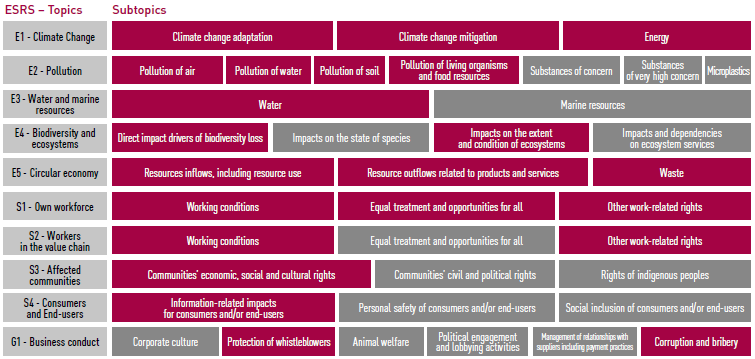Every year Cementir undertakes an analysis of all the sustainability themes that can be considered relevant for the company and its stakeholders.
The definition of material topics
In 2024 the Group adopted the Corporate Sustainability Reporting Directive (CSRD), which introduces the principle of Double Materiality Assessment (DMA), based on two dimensions:
- Impact materiality, referring to the significant effects the company has on the environment and society;
- Financial materiality, referring to the impacts of environmental, social, and governance (ESG) topics on the company’s economic and financial performance.
Results of the Double Materiality Assessment
During 2024, Cementir carried out an assessment process of Impacts, Risks, and Opportunities (IRO), leading to the definition of the Group’s material topics. These topics were classified into three equally distributed different categories: environmental, social, and governance.
The information disclosed in the Sustainability Statement was prepared based on the European Sustainability Reporting Standards (ESRS), issued by the European Financial Reporting Advisory Group (EFRAG), to serve the public interest.
The Sustainability Statement consolidates the information on the entire Cementir Group, covering the main value chain, including the Impacts, Risks, and Opportunities (IROs) identified across its upstream, downstream, and own operations.
The Company’ strategy is supported by the ERM, through the analysis of climate risks that mostly impact the company's type of business. The strategy is constantly updated based on the risks monitored through ERM and the scenario analysis.
Who our Stakeholders are
We change methods and frequency of involvement of our stakeholders depending on the type of subject, topic of interest and local features. In consideration of the nature of “Holding” of the Parent Company, some of these stakeholders interface directly with the central structures, while others are strictly interested in local activities and the relationship with them is therefore delegated to local management. We work to build a strong and long-lasting relationship with all of them, as we are aware that cooperation is an important and powerful value that enables the Group to better achieve its results, long-term sustainability and improve its positive impact on people and society.
The main Group stakeholders and the corresponding topic of interest are listed below.
Stakeholders and topic of interest
-
Personnel
Cybersecurity and data protection
Diversity, Equity and Inclusion
Health and Safety
Human rights
Industrial relations
Innovation
People management and development
-
Institutions and Authorities (local and national)
Climate change and GHG emissions
Competitive behaviour and business ethics
Energy management
Health and Safety
Human rights
Industrial relations
Innovation
Other air emissions (different from GHG emissions)
Regulation
Waste and Hazardous Materials Management
-
Shareholders
Climate Change and GHG emissions
Business performance and consolidation
Competitive behaviour and business ethics
Regulation
Health and Safety
Human rights
-
Trade Unions
Human rights
Industrial relations
-
Local communities and local committees
Circular economy
Climate change and GHG emissions
Community engagement
Human rights
Other air emissions (different from GHG emissions)
Waste and Hazardous Materials Management
Water management
-
Customers
White cement (quality and application)
Customer management
Fair competition
Innovation
-
Suppliers and contractors
Circular economy
Health and safety
Reliable and Sustainable value chain
-
Environmentalist Associations
Biodiversity
Circular economy
Climate change and GHG emissions
Energy management
Innovation
Other air emissions (different from GHG emissions)
Waste and Hazardous Materials Management
Water management
-
Financiers
Business performance and consolidation
Competitive behaviour and business ethics
Regulation
Transparency and accountability
